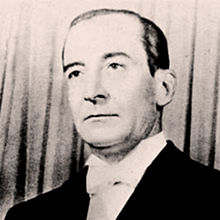Pedro Eugenio Aramburu
| Pedro Eugenio Aramburu | |
|---|---|
 |
|
|
31st President of Argentina de facto |
|
|
In office November 13, 1955 – May 1, 1958 |
|
| Vice President | Isaac Rojas |
| Preceded by | Eduardo Lonardi |
| Succeeded by | Arturo Frondizi |
| Personal details | |
| Born |
Pedro Eugenio Aramburu Silveti May 21, 1903 Río Cuarto, Córdoba, Argentina |
| Died | June 1, 1970 (aged 67) Carlos Tejedor, Buenos Aires, Argentina (assassinated) |
| Resting place | La Recoleta Cemetery |
| Nationality | Argentine |
| Political party | Unión del Pueblo Argentino (UDELPA) |
| Spouse(s) | Sara Lucía Herrera |
| Signature | |
| Military service | |
| Allegiance |
|
| Service/branch |
|
| Years of service | 1922–1958 |
| Rank |
|
Pedro Eugenio Aramburu Silveti (May 21, 1903 – June 1, 1970) was an Argentine Army general. He was a major figure behind the Revolución Libertadora, the military coup against Juan Perón in 1955. He became de facto President of Argentina from November 13, 1955 to May 1, 1958. He was kidnapped by the radical organization Montoneros on May 29, 1970 and murdered, allegedly in retaliation for the June 1956 execution of General Juan José Valle, an army officer associated with the Peronist movement, and 26 Peronist militants after a botched attempt to overthrow his regime.
In September 1955, Aramburu participated in a military coup called the "Revolución Libertadora". He led the hardliners and assumed the Presidency of Argentina himself, on November 13, 1955, after the resignation of moderate General Eduardo Lonardi. Admiral Isaac Rojas, was appointed Vice-President.
The Revolución Libertadora which overthrew Juan Domingo Perón was triggered in part by the Perón's public confrontation with the Catholic Church over divorce laws, his actions towards the press, as well as the imprisonment of opposition leaders and economic instability. The Revolución Libertadora led to three years of military rule under Aramburu, who allowed elections to be held in 1958 (won by Arturo Frondizi.)
Aramburu's military government forced Perón into exile and barred the Peronist party from further elections. Known Peronists were persecuted and often imprisoned, or murdered; the mere mention of Juan or Eva Perón's names was declared illegal under Decree Law 4161/56. Perón lived in exile in Spain until 1973 under the protection of Generalísimo Francisco Franco.
After the end of his presidential term in 1958, Aramburu retired from the military career and devoted himself entirely to politics.
...
Wikipedia
